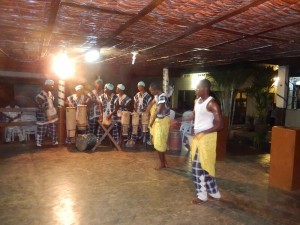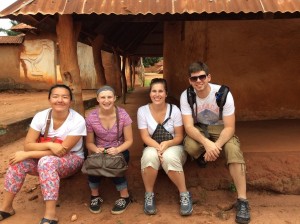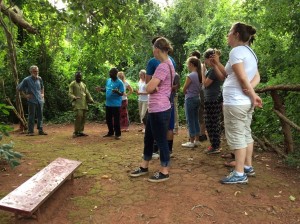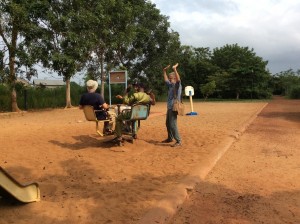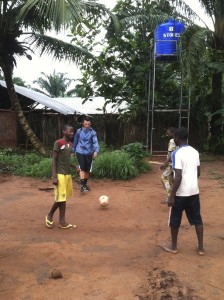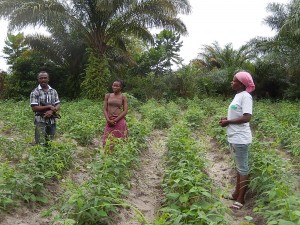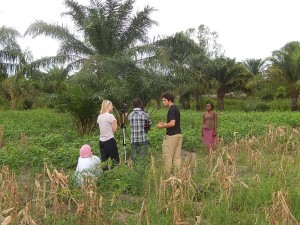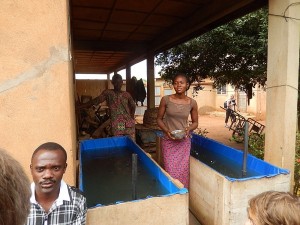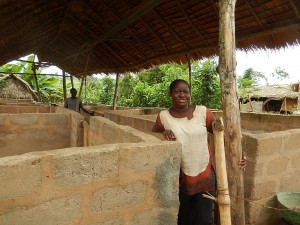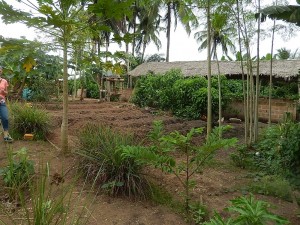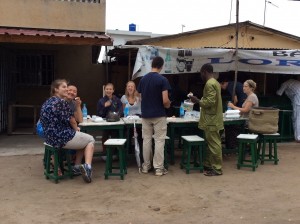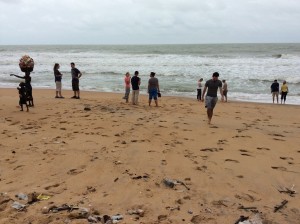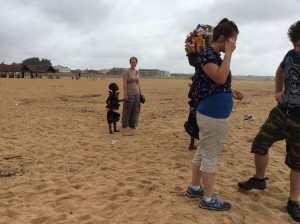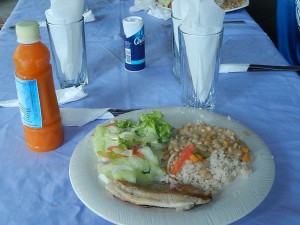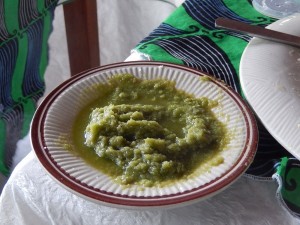A.M.D.G.
Bonsoir! I can’t believe today was our final full day in Benin and that in less than 24 hours we’ll be taking off out of this beautiful country. During our 13 days here I’ve experienced so much, and after retreating from social media for nearly 2 weeks I’ve felt the urge to take some time to reflect upon my visit and share a few special moments on this blog with the many who made this trip possible.
In America, we often like to use the words “Awesome”, “Wow”, “Spectacular”, and “Special” almost daily. At the least, I hear and some times say these words around GU weekly. Well, one of the things I’ve realized on this trip is that words such as these should be reserved for truly unique experiences like what we’ve had. I especially feel this way because while looking back I’m starting to believe this journey has turned out to be one of the biggest (if not the biggest) formative experiences of my life. “Authentic” is a word I believe captures much of the feel this trip has conveyed. Nevertheless, despite all the priceless moments and memories I hope to carry with me the rest of my life, it is fair to say my time in Benin has contained its share of challenges.
Thus far in my life, I’ve had the privilege to travel many places across the globe. Yet, I’d never been to a “3rd World or Developing Country.” Also, prior to this adventure no one in my family, including myself, had stepped foot on the continent of Africa. Just deciding to go on this trip involved an element of risk taking for my family and I. However, once we finally arrived in Benin (at night) things didn’t look so bad and check in at the marvelous Songhai Center was simple and smooth easing any tension I felt. Sure, the hot water in the shower wasn’t the best, and my room did not have a seat on our toilet, but I was confident these were small obstacles we could overcome and my roommate Brain and I have done fine (Brian’s been great!). However, on day 1 when we went outside the Songhai walls for the first time is when it first hit me- POVERTY. Once outside the paradise that is Songhai I found what I had signed up for. In the local Porto-Novo market I felt uncomfortable; I felt in it! We were in all the action occurring on the muddy streets, right in the chaos! While this situation was alarming at first, such circumstances during our journey became consoling overtime when the poorest of the poor would smile at us, or the most hungry of children would offer us an enthusiastic wave. Once I had been through the Porto-Novo market, I KNEW I WAS IN AFRICA, and I truly felt for the first time in my life that I WAS IN A DIFFERENT WORLD.
In this new world we were forced to adjust to, additional challenges included the foreign food and language barrier. Also, there were some cultural norms that the locals and us just sometimes didn’t know how to go about. For instance, some of the locals were so intrigued and excited to see young Americans they would share their personal contact information and expect the same in return. They seemed like the kindest of people saying they just wanted to practice their English (via email or Facebook) in hopes of one day coming to America, yet it was still difficult, uncomfortable, and odd in my eyes to exchange personal information with a stranger. Figuring out a positive and polite response to these situations was hard, but humbling at the same time. While I’m not sure how much I’ll actually be talking and keeping up with some of the folks I’ve met here in Benin, they certainly will be in my prayers as I continue to engage with my faith at GU.
So again, here in Benin I learned how even the most simple of things can be challenging. For example, before this trip I’d never had to ration snacks and water with friends, and it had been a while since I’d been forced to simplify my English. What I mean by this is that most English speaking Beninese didn’t always pick up phrases like “what’s up?” or “what’s going on?”. Simplifying, and improving my communication across cultural barriers is certainly a skill I improved while here.
Furthermore, other fears I’ve positively dealt with while here relate to health and possible violence. Not to be negative, but I think one would be lying if they came to today’s modern Africa stating they had absolutely no worries about possible diseases, viruses, or cruel terrorist groups. Every day I’ve been praying for our safety, and I know so many have been at home too, and so far we’ve been safe and healthy and we obviously hope this continues for the next 24 hours as we’re not out of the jungle yet (Literally!). The past 13 days have helped me become more comfortable in less “organized” and more remote environments and as a result my faith and trust in others and God has gracefully increased. It’s quite a blessing and something that needed to happen for me!
In retrospect, while I’ve spoken about these challenges I’ve faced in Benin, in reality they don’t even compare to or touch the surface of the struggles most of the Beninese face every day. By being here I’ve noticed how every meal, every CFA (money), and frankly every moment of life is appreciated even in the smallest, most remote of villages. In Benin, life is lived on the margins, LIFE IS FRAGILE. On day two we drove by a man who had been hit by some type of vehicle. Driving by we vividly saw him bleeding in multiple places and it pains to know the quality of healthcare, or lack thereof, offered in response to such a life threatening accident. Again, it’s challenging- difficult to accept and understand. The traveler is forced to struggle and question as we’re left figuring out HOW TO RESPOND!
At the end of the day, no matter what one says, we’re called to be ZAGS because of these challenges! As college students, we’re in a great position to experience and investigate life’s questions, and it’s our duty to offer compassion and healing for those who need it most. While in the 13 days we’ve been here we haven’t elevated Benin’s economy, we’ve left our mark in the smallest of ways, and in ways that cannot be measured materialistically. After all, aren’t some of the best and most important parts of life those that cannot be valued monetarily? That’s something I’ve learned on this journey as I haven’t received one materialistic gift from anyone here, but rather I leave with a bounty of personal, heart-felt fulfillment I couldn’t find at home in the US. It is for this I’m extremely grateful, and humbled I was able to make this life changing journey.
In the end, it would not be fair to celebrate this experience without acknowledging all those who made it possible. First, I would like to thank those in Spokane who made this trip feasible – THANK YOU Richard & Katuska for all your time and thorough organization. Next, I must thank Father Nzamujo and the Songhai Center for hosting us and preparing all our meals. It was truly a privilege to stay here, and the work being done at Songhai is absolutely inspiring. Emile, and the rest of the Songhai team have without doubt gone above and beyond- for that, THANK YOU!
Then, back in the US, I must salute all the parents who made sacrifices so all of us could be here! I wouldn’t want to do this trip again with any other group than your marvelous sons and daughters. It was quite a team we had here full of talented individuals, and for that I’m grateful! Also, thank you to all loved ones across the world who sent thoughts and prayers in whatever form! That contribution in particular, and all well wishes cannot be discounted in any regard, and I apologize to those who I may be missing…
But, ultimately, we’ve gotten to the point where we all must thank our fearless leaders! Mark & Torunn, it was a pleasure. Thank you for guiding me under your wings and helping me authentically experience the world like I never had before. The countless work both of you put into this trip cannot be measured, and without doubt it paid of! Freedom is a feeling I believe we all should be experiencing because together we’ve come to so many new understandings about a variety of things, and now we have the honor of sharing newfound experiences and understanding with those back in Spokane and our loved ones at home. Again, THANK YOU, THANK YOU!
Finally, I must take a moment to thank my parents! 🙂
Mom and Dad, in a few hours you’re gonna get a new Robert and I hope you’re okay with that. I’m confident things will work out like always (haha) and I can’t wait to embrace you two and tell you all about this experience of a life time….LOVE YOU BOTH and see you in Paris shortly….
Now, again, IT’S TIME TO ACCEPT THE CHALLENGE! We’re ZAGS, and we’re ready to continue “setting the world on fire” helping make the world a better place! Please pray we have a safe journey home, and GO ZAGS!!
Robert Anthony Ercoli, Class of 2016
